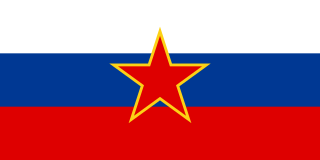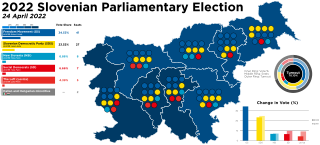The politics of Slovenia takes place in a framework of a parliamentary representative democratic republic, whereby the Prime Minister of Slovenia is the head of government, and of a multi-party system. Executive power is exercised by the Government of Slovenia. Legislative power is vested in the National Assembly and in minor part in the National Council. The judiciary of Slovenia is independent of the executive and the legislature.
Liberal Democracy of Slovenia is a social-liberal political party in Slovenia. Between 1992 and 2004 it was the largest party in the country. In the 2011 Slovenian parliamentary election, it failed to win entry to the Slovenian National Assembly. The party was a member of the Liberal International and the Alliance of Liberals and Democrats for Europe.

The Slovenian People's Party is a conservative, agrarian, Christian-democratic political party in Slovenia. Formed in 1988 under the name of Slovenian Peasant Union as the first democratic political organization in Yugoslavia, it changed its name to Slovenian People's Party in 1992. On 15 April 2000 it merged with the Slovene Christian Democrats to form the SLS+SKD Slovenian People's Party, and changed its name in 2001 to Slovenian People's Party.
A snap election is an election that is called earlier than the one that has been scheduled.

The Social Democrats is a centre-left and pro-European social-democratic political party in Slovenia led by Tanja Fajon. From 1993 until 2005, the party was known as the United List of Social Democrats. It is the successor of the League of Communists of Slovenia. As of 2022, the party is a member of a three-party coalition government with Robert Golob's Freedom Movement alongside The Left, as well as a full member of the Party of European Socialists and Progressive Alliance.
Parliamentary elections were held in Slovenia on Sunday, 3 October 2004 to elect the 90 deputies of the National Assembly. A total of 1,390 male and female candidates ran in the election, organized into 155 lists. The lists were compiled both by official political parties and the groups of voters not registered as political parties. Five candidates applied for the seat of the representative of the Hungarian "national community" and only one candidate applied for the seat of the representative of the Italian national community. In the previous election (2000), fewer than 1000 candidates on 155 lists applied.

Alojz "Lojze" Peterle is a Slovenian politician. He is a member of New Slovenia, part of the European People's Party. He served as Prime Minister of Slovenia from 1990 to 1992, Leader of the Christian Democrats from the founding of the party in 1990 until it merged with the Slovenian People's Party in 2000, and was Minister of Foreign Affairs from 1993 to 1994 and again in 2000. He was a Member of the National Assembly from 1996 to 2004, and a Member of the European Parliament from 2004 to 2019.

The Slovenian National Party is a nationalist political party in Slovenia led by Zmago Jelinčič Plemeniti. The party is known for its Euroscepticism and opposes Slovenia's membership in NATO. It also engages in what many consider to be historical negationism of events in Slovenia during World War II.

The Andrej Čuš and Greens of Slovenia is a political party in Slovenia.

Parliamentary elections were held in Slovenia on 21 September 2008 to elect the 90 deputies of the National Assembly. 17 parties filed to run in the election, including all nine parliamentary parties. The election was won by the Social Democrats (SD), who then went on to form a government together with Zares, Liberal Democracy of Slovenia (LDS) and the Democratic Party of Pensioners of Slovenia (DeSUS).

The Socialist Republic of Slovenia, commonly referred to as Socialist Slovenia or simply Slovenia, was one of the six federal republics forming Yugoslavia and the nation state of the Slovenes. It existed under various names from its creation on 29 November 1945 until 25 June 1991.

Milan Zver is a Slovenian politician and Member of the European Parliament (MEP) from Slovenia. He is a member of the Slovenian Democratic Party, part of the European People's Party. He is the Vice-President of the Slovenian Democratic Party. He served as Minister of Education and Sports from 2004 to 2008.
The Government of the Republic of Slovenia exercises executive authority in Slovenia pursuant to the Constitution and the laws of Slovenia. It is also the highest administrative authority in Slovenia.

The prime minister of Slovenia, officially the president of the Government of the Republic of Slovenia, is the head of the Government of the Republic of Slovenia. There have been nine officeholders since the country gained parliamentary democracy in 1989 and independence in 1991.

Elections were held on municipal, provincial, republican and federal levels in Yugoslavia from its foundation in 1918 throughout its breakup in 1992.
Parliamentary elections were held in Slovenia on 6 and 10 December 1992. The result was a victory for Liberal Democratic Party, which won 22 of the 90 seats. Party leader Janez Drnovsek was re-elected Prime Minister by the Parliament on 12 January 1993.
Parliamentary elections were held in Slovenia on 15 October 2000. The result was a victory for Liberal Democracy of Slovenia, which won 34 of the 90 seats. Following the election, Liberal Democracy leader Janez Drnovšek returned to the post of Prime Minister.

The Left is an eco-socialist and democratic socialist political party in Slovenia. The party was established on 24 June 2017 by the merger of the Party for Sustainable Development of Slovenia (TRS) and Initiative for Democratic Socialism (IDS). The party is a successor of the left-wing electoral alliance, the United Left.

Parliamentary elections were held in Slovenia on 24 April 2022 to elect all 90 members of the National Assembly.

















